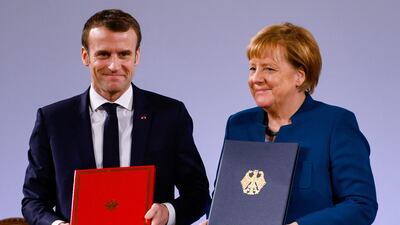France and Germany have renewed a 1963 treaty to further entrench their ties at a time when populist parties and the UK’s planned departure from the EU has placed increased strain on the bloc.
The deal intends to forge closer ties in foreign police and defence, with German chancellor Angela Merkel speaking of a possible “European army” via a “joint military culture.”
French president Emmanuel Macron said the deal must be used to strengthen the EU (maybe European?) “people from the tumults of the world,” at a ceremony held at the border town of Aachen on Tuesday.
“At a time when Europe is threatened by nationalism, which is growing from within, when Europe is shaken by the pains of Brexit and worried by global changes that go far beyond the national level ... Germany and France must assume their responsibility and show the way forward,” he told an audience of European leaders.
"(The threat) comes from outside Europe and from within our societies if we are not able to respond to the growing anger,” added Mr Macron.
The pact has, however, led to a barrage of criticism from nationalists with Marine Le Pen, head of France’s National Front, claiming it was “an act that borders on treason.”
It has, in fact, been described as an extension of the 1963 Elysee Treaty between France and Germany that sought to nurture better relations between the two countries in the wake of two devastating world wars.
The treaty stipulates France will help push for German inclusion to the five-strong permanent members of the UN Security Council. This was seized upon by Ms Le Pen who told a rally last week: “Emmanuel Macron now wants to share this seat with the Germans.” In a video that spread across social media she alleged the deal would put France’s border region of Alsace partially under German control.
The Elysee has since hit back, rejecting the UN seat-sharing allegations and admonishing those who have said the Alsace population would learn German or France would lose its sovereignty.
_______________
Read more:
France summons Italian envoy over ‘unacceptable’ colonial jibes
The UK asks Ireland to compromise for Brexit plan B
EU states boycott Iran summit US called in Poland
_______________
Alexander Gauland, co-chief of Germany’s far-right AfD party, said the two governments were trying to make a “super EU” within the bloc. “The EU is now deeply divided. A German-French special relationship will alienate us even further from the other Europeans,” he said.
Mr Macron has come under a barrage of criticism in France as ‘Yellow Jacket’ protestors have taken to the streets against his leadership. Mrs Merkel announced last October she would step down as chancellor nor would she stay on as party leader of Christian Democratic Union.
The Sand Castle
Director: Matty Brown
Stars: Nadine Labaki, Ziad Bakri, Zain Al Rafeea, Riman Al Rafeea
Rating: 2.5/5
Bharat
Director: Ali Abbas Zafar
Starring: Salman Khan, Katrina Kaif, Sunil Grover
Rating: 2.5 out of 5 stars
Ibrahim's play list
Completed an electrical diploma at the Adnoc Technical Institute
Works as a public relations officer with Adnoc
Apart from the piano, he plays the accordion, oud and guitar
His favourite composer is Johann Sebastian Bach
Also enjoys listening to Mozart
Likes all genres of music including Arabic music and jazz
Enjoys rock groups Scorpions and Metallica
Other musicians he likes are Syrian-American pianist Malek Jandali and Lebanese oud player Rabih Abou Khalil
Company%20Profile
%3Cp%3E%3Cstrong%3EName%3A%3C%2Fstrong%3E%20HyveGeo%3Cbr%3E%3Cstrong%3EStarted%3A%3C%2Fstrong%3E%202023%3Cbr%3E%3Cstrong%3EFounders%3A%3C%2Fstrong%3E%20Abdulaziz%20bin%20Redha%2C%20Dr%20Samsurin%20Welch%2C%20Eva%20Morales%20and%20Dr%20Harjit%20Singh%3Cbr%3E%3Cstrong%3EBased%3A%20%3C%2Fstrong%3ECambridge%20and%20Dubai%3Cbr%3E%3Cstrong%3ENumber%20of%20employees%3A%3C%2Fstrong%3E%208%3Cbr%3E%3Cstrong%3EIndustry%3A%20%3C%2Fstrong%3ESustainability%20%26amp%3B%20Environment%3Cbr%3E%3Cstrong%3EFunding%3A%20%3C%2Fstrong%3E%24200%2C000%20plus%20undisclosed%20grant%3Cbr%3E%3Cstrong%3EInvestors%3A%20%3C%2Fstrong%3EVenture%20capital%20and%20government%3C%2Fp%3E%0A
'HIJRAH%3A%20IN%20THE%20FOOTSTEPS%20OF%20THE%20PROPHET'
%3Cp%3E%3Cstrong%3EEdited%20by%3A%3C%2Fstrong%3E%20Idries%20Trevathan%3Cbr%3E%3Cstrong%3EPages%3A%3C%2Fstrong%3E%20240%3Cbr%3E%3Cstrong%3EPublisher%3A%3C%2Fstrong%3E%20Hirmer%20Publishers%3Cbr%3E%3Cstrong%3EAvailable%3A%3C%2Fstrong%3E%20Now%3C%2Fp%3E%0A
House-hunting
Top 10 locations for inquiries from US house hunters, according to Rightmove
- Edinburgh, Scotland
- Westminster, London
- Camden, London
- Glasgow, Scotland
- Islington, London
- Kensington and Chelsea, London
- Highlands, Scotland
- Argyll and Bute, Scotland
- Fife, Scotland
- Tower Hamlets, London
MOUNTAINHEAD REVIEW
Starring: Ramy Youssef, Steve Carell, Jason Schwartzman
Director: Jesse Armstrong
Rating: 3.5/5
LA LIGA FIXTURES
Friday
Granada v Real Betis (9.30pm)
Valencia v Levante (midnight)
Saturday
Espanyol v Alaves (4pm)
Celta Vigo v Villarreal (7pm)
Leganes v Real Valladolid (9.30pm)
Mallorca v Barcelona (midnight)
Sunday
Atletic Bilbao v Atletico Madrid (4pm)
Real Madrid v Eibar (9.30pm)
Real Sociedad v Osasuna (midnight)
Film: Raid
Dir: Rajkumar Gupta
Starring: Ajay Devgn, Ileana D'cruz and Saurabh Shukla
Verdict: Three stars
Volvo ES90 Specs
Engine: Electric single motor (96kW), twin motor (106kW) and twin motor performance (106kW)
Power: 333hp, 449hp, 680hp
Torque: 480Nm, 670Nm, 870Nm
On sale: Later in 2025 or early 2026, depending on region
Price: Exact regional pricing TBA
Key facilities
- Olympic-size swimming pool with a split bulkhead for multi-use configurations, including water polo and 50m/25m training lanes
- Premier League-standard football pitch
- 400m Olympic running track
- NBA-spec basketball court with auditorium
- 600-seat auditorium
- Spaces for historical and cultural exploration
- An elevated football field that doubles as a helipad
- Specialist robotics and science laboratories
- AR and VR-enabled learning centres
- Disruption Lab and Research Centre for developing entrepreneurial skills
Sole survivors
- Cecelia Crocker was on board Northwest Airlines Flight 255 in 1987 when it crashed in Detroit, killing 154 people, including her parents and brother. The plane had hit a light pole on take off
- George Lamson Jr, from Minnesota, was on a Galaxy Airlines flight that crashed in Reno in 1985, killing 68 people. His entire seat was launched out of the plane
- Bahia Bakari, then 12, survived when a Yemenia Airways flight crashed near the Comoros in 2009, killing 152. She was found clinging to wreckage after floating in the ocean for 13 hours.
- Jim Polehinke was the co-pilot and sole survivor of a 2006 Comair flight that crashed in Lexington, Kentucky, killing 49.

